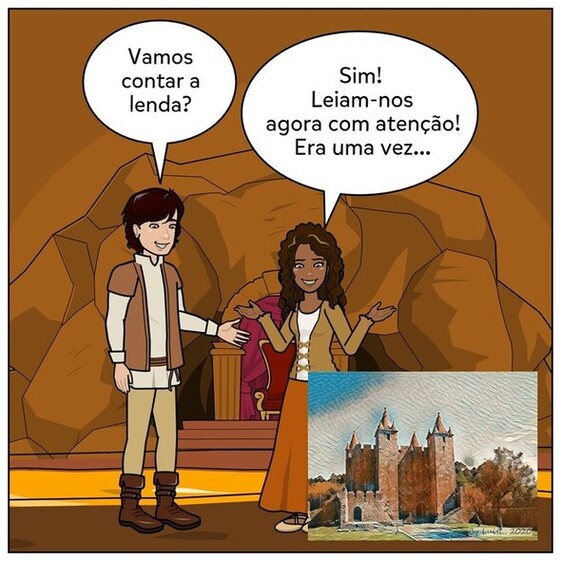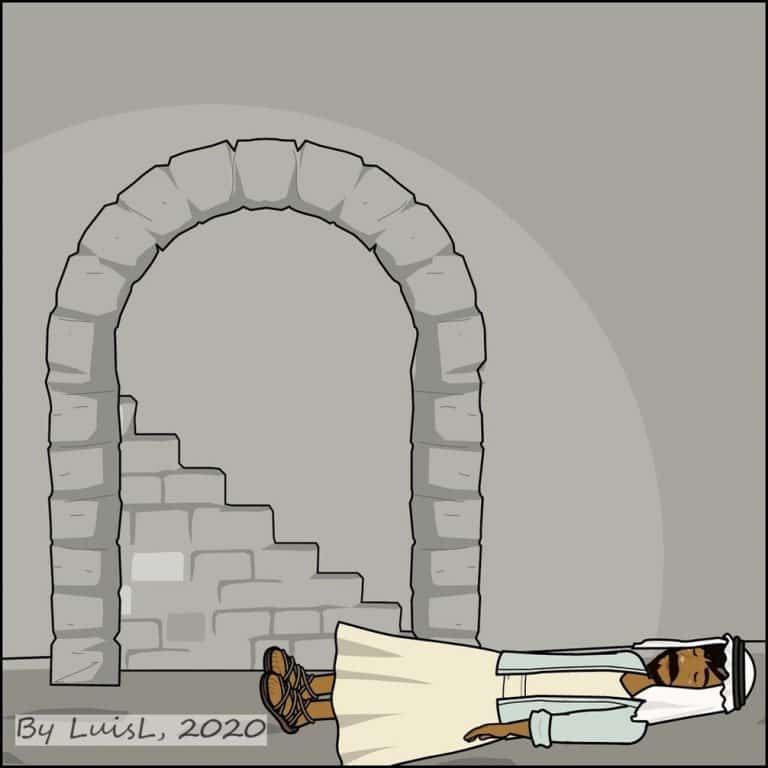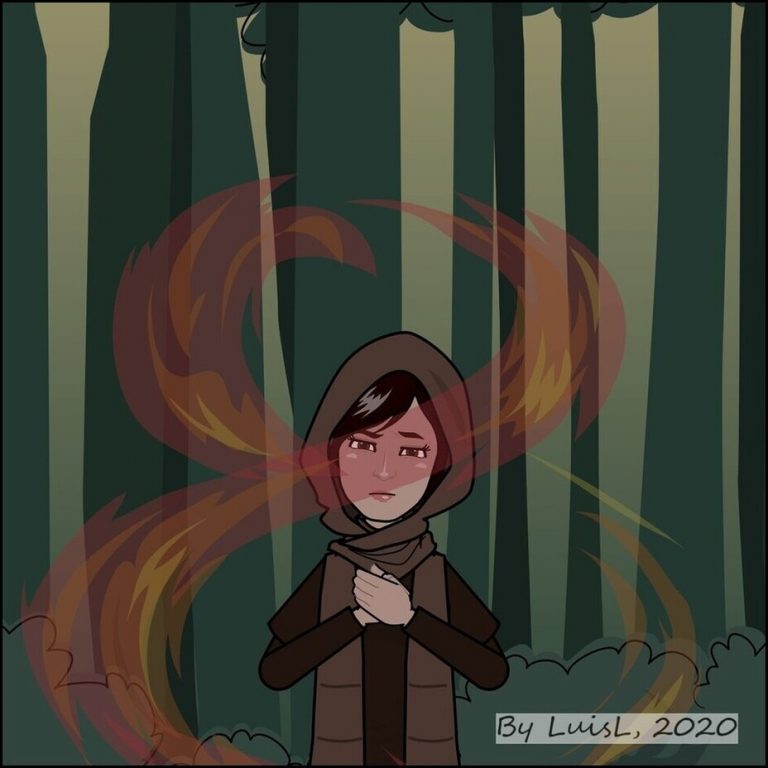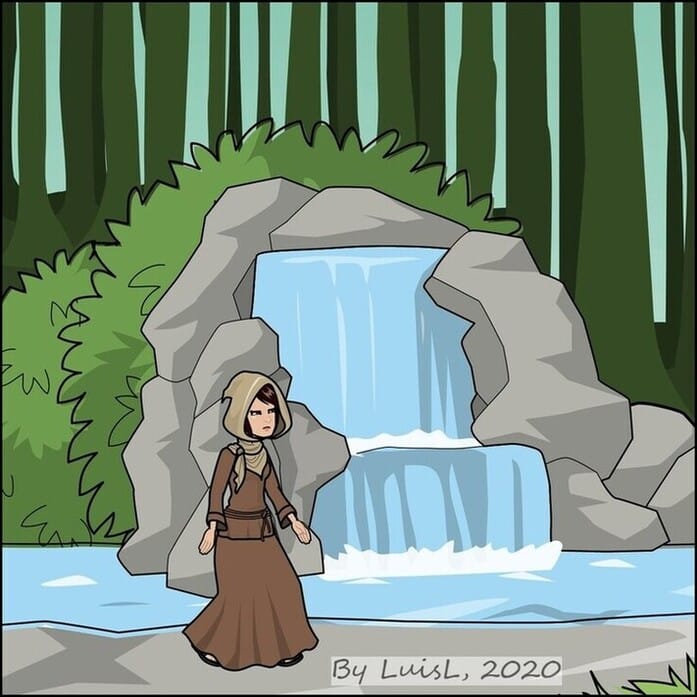
LENDA DA TOMADA DO CASTELO PELOS CRISTÃOS
Episódio 1
1. A bondade de Lia
2. O estratagema de Ben Iussef
3. O casamento da cristã com o mouro
Episódio 2
4. O conspirador e o crime
5. A transfiguração de Lia
6. O plano da vingança
Episódio 3
7. Estranhos acontecimentos
8. O encontro do assassino com a velha da água
Episódio 4
9. A realização da profecia
10. O assalto do castelo
11. A fuga de Ben Alígula
EPISÓDIO 2
4. O conspirador e o crime
Um ambicioso irmão do governador, de nome Ben Alígula, invejoso daquela felicidade, e, sobretudo, sedento de poder, suspeitou que Lia continuava a ser cristã e procurava introduzir no castelo aquela doutrina, com conhecimento de lussef.
Assim, correu a Córdova, de cujo Califado o castelo dependia, onde fez a denúncia e obteve a sentença de morte do irmão, ficando ele governador.
Regressado ao castelo, ordenou a prisão de lussef e de Lia, mas deu-se um caso extraordinário: ninguém cumpriu as suas ordens.

Então Ben Alígula, desesperado e com medo de que a guarnição o assassinasse para que seu irmão continuasse governador do castelo, apunhalou-o cobardemente.
Houve tumultos e um princípio de revolta, mas Lia conseguiu acalmar os espíritos e levar os soldados a obedecer, dizendo-lhes que o poder vem aos homens por vontade de Deus, pelo que se deviam submeter às ordens do Kalifa de Córdova e, portanto, obedecer ao novo governador.
Ben Alígula, vendo-se obedecido, deu cumprimento à sentença que condenava também Lia à morte. Porém, com receio de que a sua execução no castelo pudesse provocar novas desordens e até uma revolta, entregou-a secretamente a um pelotão executor a quem deu as seguintes instruções:
– Levai-a até Corujeiras (Corujeiras é um dos montes vizinhos do castelo, situado a norte, em terras de S. João de Ver) e naquele cabeço, que vejo daqui, abri-lhe as veias e recolhei o seu sangue neste vaso e trazei-o para eu dar aos meus cães.
Depois despi-a, queimai-a e lançai as suas cinzas ao vento. Que dessa serpente venenosa que aqui entrou não fiquem vestígios.
Tudo isto, de olhos vendados, ouviu Lia. Encomendando a sua alma a Deus e pedindo protecção à Virgem Santa Maria, sem um protesto, sem um queixume, deixou-se conduzir ao lugar do suplício.
Depois de uma boa caminhada, num sítio ermo que não podia ser visto do castelo, os soldados fizeram uma paragem e um deles dirigiu-se a Lia:

– Irmã, não vos assusteis, não é aqui o lugar do suplício. Eu vou tirar-vos a venda, mas é por bem. (Lia tinha ensinado a muitos soldados que todos eram irmãos em Cristo e era assim que na intimidade se tratavam).
– Ah! És tu Jineff? Como o destino é cruel. Serás então tu um dos meus carrascos? Tu em quem eu depositava toda a minha confiança? Meu Deus, terei de sofrer esta afronta antes de morrer? Deus meu, fazei com que eu possa perdoar aos meus carrascos, principalmente a este.
E aquela infeliz desatou num choro convulsivo que a todos entristeceu.
– Senhora, minha boa irmã, acalmai-vos. A Virgem entregou-vos nas minhas mãos para vos salvar de morte tão vergonhosa. Aqui tendes estas vestes de homem, este cajado e esta sacola. Assim disfarçada de pedinte podereis alcançar a casa de vosso pai.

– Perdoa-me, Jineff, por ter duvidado de ti, mas não posso aceitar o teu oferecimento. Não devo salvar a minha vida à custa da vossa. Não tendes vós de apresentar o meu sangue a Alígula?
– Tranquilizai-vos, irmã. Nós daremos o nosso sangue por vós. Só vos pedimos que nos ajudeis porque sabeis tratar melhor das feridas do que nós.
Lia, depois de muito protestar, porque não queria que eles arriscassem a sua vida por amor dela, tendo-se convencido de que podia salvar-se sem que os soldados corressem perigo, acabou por se submeter à sua vontade.
Com um estilete que Jineff havia levado, abriu-lhes as veias que após a recolha do sangue, ia laqueando com segurança.
Feito isto, Lia, depois de uma triste e emocionante despedida, pôs-se a caminho de Cale e os soldados dirigiram-se ao cabeço onde derrubaram algumas árvores e fizeram uma grande fogueira que se avistava do Castelo.
À noite, Jineff apresentou-se a Alígula:
– Missão cumprida aqui testemunhada com as suas vestes e o seu sangue.
5. A transfiguração de Lia
Lia em casa de seu pai tinha interiores assomos de revolta e, sem dar conta, deixava-se arrebatar por uma terrível vontade de vingar-se, mas, caindo em si, logo sentia grande angústia por se sentir dominada pelo ódio, pelo desejo de vingança.

– Vingança! Palavra terrível, sentimento indigno de uma alma cristã. Vingança! Vai-te, tentação má. A minha alma não será manchada com tão odiento pecado. Vingar-me? Pagar o mal com o mal? Não, nunca. Mas deixar-me-ei ficar indiferente perante tão horrendo crime? Também não.
Com estes pensamentos desencontrados, dirigiu-se à ermida e, prostrada diante da imagem da Senhora Santa Maria exclamou:
– Senhora, iluminai o meu espírito, ensinai-me o que devo fazer nesta conjuntura tão dolorosa.
Depois de uma longa meditação, exclamou, cheia de alegria:
– Obrigada, Senhora, pela luz que trouxeste ao meu espírito.
Aquela luz, aquele sussurro divino, num relance, tinha-lhe ensinado como se poderia vingar sem ódio, sem rancor, ou mais exatamente, como se poderia vingar sem vingança.

Aproximou-se de um espelho e contemplou-se por instantes. Era ainda bela, de uma beleza que se poderia classificar de fascinante.
– Senhora – exclamou – dai-me coragem para eu transformar esta beleza em fealdade.
Em cima de uma mesa colocou um bisturi, pensos e bálsamo. Com o bisturi fez alguns cortes na face e no rosto. Depois colocou pensos com bálsamo sobre as feridas. Quando, passados tempos, tirou os pensos e se viu ao espelho, não se achou feia, achou-se horrível, impossível de ser reconhecida fosse por quem fosse.
Porém, em vez de ficar triste, aquela fealdade entusiasmou-a. Já podia agora pôr em prática o seu plano de vingança sem ódio, sem rancor, sem vingança.
6. O plano da vingança
Da antiga estrada romana de Olissipo a Brácara Augusta, que passava próxima da povoação que hoje chamamos Albergaria, da freguesia de S. João de Ver, partia um atalho que ia dar a umas nascentes que, correndo para Oeste iam abastecer uma pequena povoação existente onde hoje é a Vila, sede do concelho.
Uma das fontes, pela pureza da sua água, tinha fama de miraculosa e a ela recorriam não só as pessoas das proximidades, como outras vindas de muito longe. Ali permanecia uma pobre mulher a esmolar que ensinava o caminho da fonte miraculosa.
Pois Lia iria substituir a pedinte e uma vez ali fácil lhe seria pôr em prática o projeto que havia imaginado. E assim fez. Lia era agora a velha da água. Jineff vinha vê-Ia muitas vezes e passavam horas em confidência.

No castelo existiam caminhos secretos e Lia sabia da sua existência por intermédio de Ben lussef. Para poder levar a cabo o que havia imaginado, informou Jineff detalhadamente do que pretendia fazer, bem como dos perigos que correria qualquer intruso se um dia viesse a penetrar no seu interior.
Quando ficou familiarizado com todos os caminhos secretos e senhor de todos os seus segredos, Jineff ia começar a agir conforme as instruções dadas por Lia. Principiou por espalhar certos boatos que trouxeram o desassossego ao castelo.
Durante a noite passavam-se também coisas extraordinárias: ouviam-se ruídos, cuja origem se desconhecia, e vozes estranhas, acompanhadas de gritos indistintos no terreiro e o uivar lúgubre dos cães. Estes acontecimentos traziam aterrorizada a guarnição.

No quarto de Alígula factos não menos estranhos se passavam: os móveis dançavam e embatiam uns nos outros; vozes medonhas, entrecortadas por ais misteriosos, faziam-se ouvir através das paredes.
Ele andava assustado, mas com receio de que se rissem do seu medo, ocultava todos estes acontecimentos; mas a repetição contínua destas ocorrências levou-o a consultar os seus astrólogos, que, apesar da sua boa vontade, nada lhe souberam dizer de positivo.
Entretanto, tinha chegado ao castelo a fama extraordinária da Velha da água que lia nas estrelas o passado e o futuro com uma segurança e exatidão, feito nunca até então conseguido pelos mais famosos adivinhos.
Jineff contava maravilhas da Velha e insistia com Alígula para que a consultasse, ao que ele sempre se negava, querendo assim mostrar que nada o atemorizava.
Gostou? Então partilhe!
